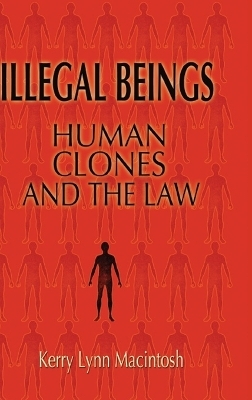
Illegal Beings
Cambridge University Press (Verlag)
978-0-521-85328-6 (ISBN)
Many people think human reproductive cloning should be a crime. In America some states have already outlawed cloning and Congress is working to enact a national ban. Meanwhile, scientific research continues, both in America and abroad and soon reproductive cloning may become possible. If that happens, cloning cannot be stopped. Infertile couples and others will choose to have babies through cloning, even if they have to break the law. This book explains that the most common objections to cloning are false or exaggerated. The objections reflect and inspire unjustified stereotypes about human clones and anti-cloning laws reinforce these stereotypes and stigmatize human clones as subhuman and unworthy of existence. This injures not only human clones, but also the egalitarianism upon which our society is based. Applying the same reasoning used to invalidate racial segregation, this book argues that anti-cloning laws violate the equal protection guarantee and are unconstitutional.
Kerry Lynn Macintosh is a member of the law and technology faculty at Santa Clara University School of Law. She received her B.A. from Pomona College and her J.D. from Stanford Law School, where she was elected to the Order of the Coif. She has published papers and articles in the field of law and technology in journals such as Harvard Journal of Law & Technology, Boston University Journal of Science, and Berkeley Technology Law Journal.
Introduction; Part I. Five Common Objections to Human Reproductive Cloning Reflect, Reinforce, and Inspire Stereotypes about Human Clones: 1. Does human reproductive cloning offend God and nature?; 2. Should children be begotten and not made?; 3. Do human clones lack individuality?; 4. Could human clones destroy humanity?; 5. Does human reproductive cloning harm participants and produce children with birth defects?; Part II. Anti-Cloning Laws Are Bad Public Policy: 6. What anti-cloning laws say and do; 7. The five objections have inspired anti-cloning laws; 8. Anti-cloning laws reflect a policy of existential segregation; 9. The costs of anti-cloning laws outweigh their benefits; Part III. Anti-Cloning Laws Violate the Equal Protection Guarantee and Are Unconstitutional: 10. Anti-cloning laws classify human clones and are subject to strict scrutiny; 11. Anti-cloning laws inflict judicially cognizable injuries that confer standing; 12. Anti-cloning laws violate the equal protection guarantee; Conclusion.
| Erscheint lt. Verlag | 1.8.2005 |
|---|---|
| Zusatzinfo | Worked examples or Exercises |
| Verlagsort | Cambridge |
| Sprache | englisch |
| Maße | 158 x 236 mm |
| Gewicht | 596 g |
| Themenwelt | Medizin / Pharmazie ► Gesundheitswesen |
| Medizin / Pharmazie ► Medizinische Fachgebiete ► Medizinethik | |
| Studium ► Querschnittsbereiche ► Geschichte / Ethik der Medizin | |
| Recht / Steuern ► EU / Internationales Recht | |
| ISBN-10 | 0-521-85328-1 / 0521853281 |
| ISBN-13 | 978-0-521-85328-6 / 9780521853286 |
| Zustand | Neuware |
| Haben Sie eine Frage zum Produkt? |
aus dem Bereich


